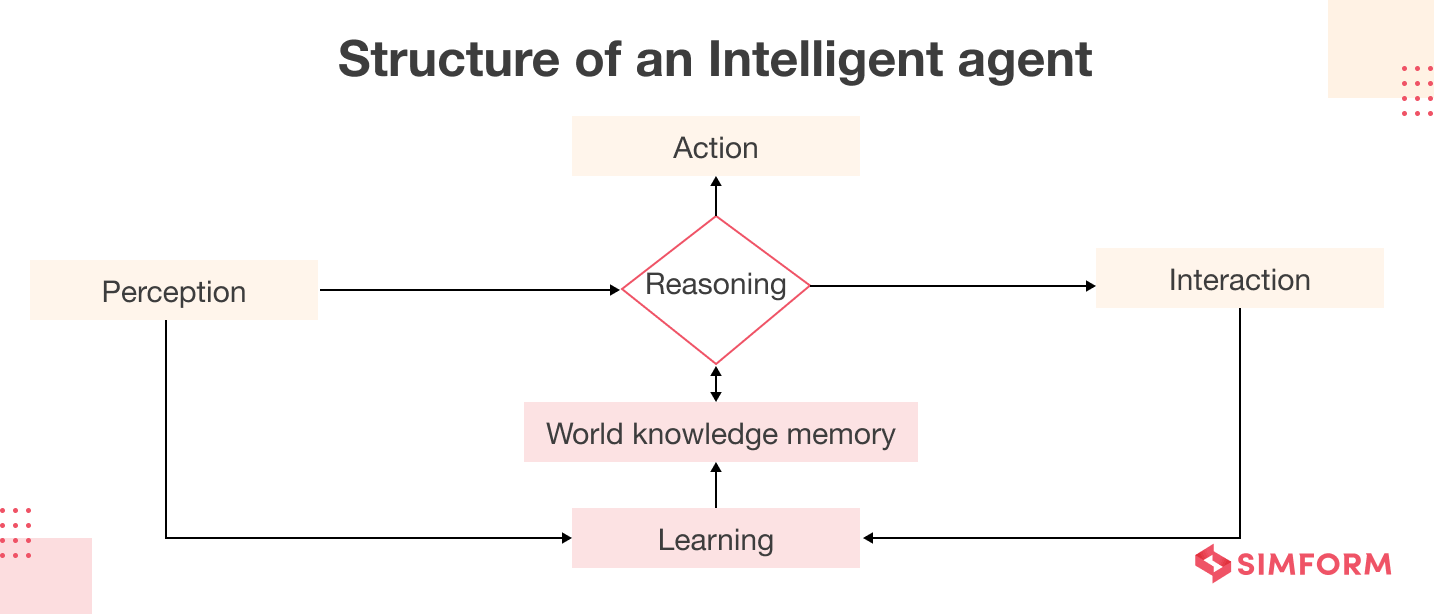Understanding Intelligent Agents in AI: Definitions, Mechanisms, and Real-World Applications

Understanding Intelligent Agents in AI: Definitions, Mechanisms, and Real-World Applications
Estimated reading time: 10 minutes
Key Takeaways
- An intelligent agent is an autonomous entity that perceives its environment and acts to achieve goals.
- Core attributes include autonomy, perception, reasoning, learning, and action selection.
- Intelligent agents operate through modules like perception, decision-making, learning, and action.
- Various types include reactive, deliberative, hybrid, and learning agents.
- Real-world applications span virtual assistants, autonomous vehicles, recommendation systems, and more.
- The future of intelligent agents involves enhanced learning, better decision-making, and advanced problem-solving.
Table of contents
- Understanding Intelligent Agents in AI: Definitions, Mechanisms, and Real-World Applications
- Key Takeaways
- What Are Intelligent Agents in AI?
- Core Attributes of Intelligent Agents
- How Intelligent Agents Work in AI: Architecture and Decision-Making
- Types and Characteristics of AI Agents
- Real-World Applications of Intelligent Agents
- Looking to the Future: The Evolution of Intelligent Agents
- Frequently Asked Questions
In today’s rapidly evolving technological landscape, intelligent agents in AI represent a cornerstone of artificial intelligence development. These autonomous entities are revolutionizing how machines interact with their environment, make decisions, and solve complex problems. Let’s dive deep into what intelligent agents are, how they work, and their real-world applications.
What Are Intelligent Agents in AI?
An intelligent agent in AI is an autonomous entity that can perceive its environment, process information, and take actions to achieve specific goals. These agents form the building blocks of artificial intelligence systems, embodying the field’s core principle of creating machines that can think and act intelligently.
Unlike simple computer programs that follow fixed instructions, intelligent agents can:
- Operate independently with minimal human oversight
- Adapt to changing circumstances
- Learn from experience
- Make decisions based on complex environmental inputs
Intelligent Agent, Sapien Definition
Core Attributes of Intelligent Agents
To truly understand what makes an intelligent agent “intelligent,” let’s examine their essential characteristics:
Autonomy
- Operates independently
- Makes decisions without constant human input
- Maintains control over internal states and actions
Perception
- Gathers data from the environment through sensors or inputs
- Processes and interprets environmental signals
- Maintains awareness of surroundings
Reasoning
- Analyzes gathered information
- Makes logical decisions based on available data
- Evaluates potential outcomes of actions
Learning
- Improves performance through experience
- Adapts behavior based on outcomes
- Updates internal models and strategies
Action Selection
- Chooses appropriate responses to situations
- Executes decisions to influence the environment
- Balances immediate and long-term goals
How Intelligent Agents Work in AI: Architecture and Decision-Making
The functionality of intelligent agents relies on a sophisticated architecture that enables continuous interaction with their environment. Here’s how they operate:
Perception Module
- Collects environmental data
- Processes sensory inputs
- Filters relevant information
Decision-Making Engine
- Analyzes current state
- Evaluates possible actions
- Selects optimal responses
Learning Component
- Updates knowledge base
- Refines decision models
- Improves future performance
Action Module
- Implements chosen decisions
- Affects environmental change
- Monitors action outcomes
The Decision-Making Loop
- Perceive environment
- Process information
- Make decisions
- Take action
- Observe results
- Repeat
Google Cloud AI Agents, AWS AI Agents
Types and Characteristics of AI Agents
Different types of AI agents serve various purposes and exhibit distinct characteristics:
Reactive Agents
- Respond directly to current inputs
- No memory of past experiences
- Fast response times
- Best for simple, immediate decisions
Deliberative Agents
- Maintain internal environmental models
- Plan future actions
- Consider long-term consequences
- Suitable for complex decision-making
Hybrid Agents
- Combine reactive and deliberative approaches
- Balance speed with planning capability
- Adaptable to various situations
- Offer flexible problem-solving
Learning Agents
- Continuously improve through experience
- Adapt to new situations
- Require training data
- Excel in dynamic environments
Wikipedia Intelligent Agent, Google Cloud AI Agents
Real-World Applications of Intelligent Agents
Intelligent agents have found numerous practical applications across various industries:
Virtual Assistants
- Siri, Alexa, Google Assistant
- Natural language processing
- Task automation
- Personalized responses
Autonomous Vehicles
- Self-driving cars
- Navigation systems
- Obstacle detection
- Real-time decision making
Recommendation Systems
- Netflix content suggestions
- Amazon product recommendations
- Spotify playlist curation
- Personalized advertising
Web Crawlers
- Search engine indexing
- Content categorization
- Link analysis
- Information gathering
Sapien Definition, Google Cloud AI Agents
Looking to the Future: The Evolution of Intelligent Agents
As artificial intelligence continues to advance, intelligent agents are becoming increasingly sophisticated and capable. Their evolution represents a crucial step toward truly autonomous AI systems that can:
- Handle complex, real-world situations
- Learn and adapt more effectively
- Make more nuanced decisions
- Operate with greater autonomy
- Solve increasingly complex problems
Future developments may include:
- Enhanced learning capabilities
- Better decision-making in uncertain conditions
- Improved collaboration between multiple agents Learn More
- More sophisticated environmental modeling
- Advanced problem-solving abilities
The role of intelligent agents in AI continues to expand, driving innovation across industries and pushing the boundaries of what’s possible in artificial intelligence. As these systems become more sophisticated, they’ll play an increasingly important role in shaping our technological future.
Wikipedia Intelligent Agent, Sapien Definition
For those interested in exploring intelligent agents further, consider diving into:
- AI and machine learning textbooks
- Research papers on agent architectures OpenAI Deep Research
- Case studies of successful implementations
- Online courses focusing on AI agents
- Programming frameworks for building intelligent agents
The field of intelligent agents represents both the current state and future potential of artificial intelligence, promising continued innovation and advancement in the years to come.
Frequently Asked Questions
Previous Blog Posts:
Understanding Intelligent Agents in AI: Definitions, Mechanisms, and Real-World Applications Estimated reading time: 10 minutes Key Takeaways An intelligent agent…
Ollama Models: A Complete Guide to Running Advanced AI Models Locally Estimated reading time: 8 minutes Key Takeaways Ollama enables…

